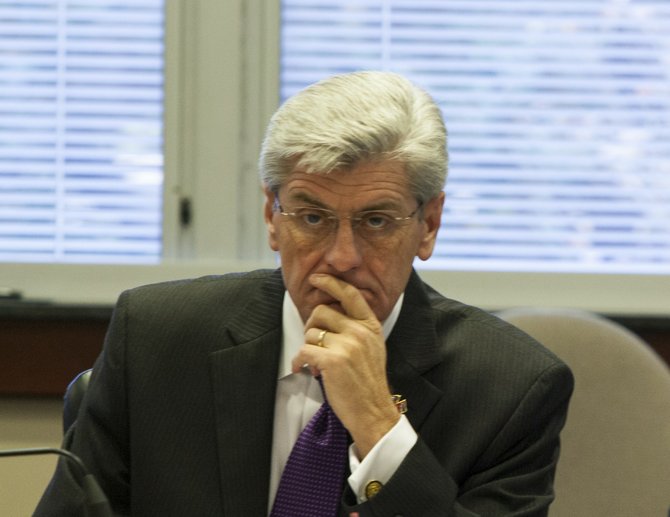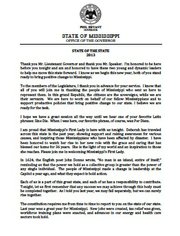Mississippi Gov. Phil Bryant Photo by Jacob Fuller.
In his annual State of the State speech, Gov. Phil Bryant beamed as he boasted of last year’s business-friendly legislative session and state-backed economic development that yielded close to 3,000 new jobs.
The jobs Bryant spoke about were created all over the state—Oxford, Pascagoula, Holly Springs, Columbus, Prentiss, Tupelo and other towns. Conspicuously absent from the governor’s eight-and-a-half page speech was any mention of the capital city save for the footer at the bottom of the page that lists the governor office’s address in Jackson.
“I don’t think he realizes we have a capital,” said Rep. Alyce Clarke, D-Jackson. Clarke said she plans to meet with the governor to talk about job creation in Jackson.
Bryant did give a nod to Nissan’s recent celebration of the carmaker’s 10-year anniversary of its facility in Canton, which is part of the Jackson metro area.
Democratic Sen. Kenneth Wayne Jones, who represents Canton, appreciated the shout out to his hometown but believes Bryant’s references to “welfare” were targeted at the constituency Jones represents. Jones also chairs the Legislative Black Caucus.
Speaking about the need for education reform, Bryant said, “We must make reforms now so that our citizens can be productive contributors to our communities and less reliant on social-welfare programs.”
Bryant, of course, used the speech, which took place in a less-than-full House chamber at 5 p.m., to reinstate his support for charter schools. The Senate passed a charter-school bill last week while the House Education Committee agreed on the House version this week.
The governor also asked the Legislature to fund 200 full scholarships for Mississippi high school seniors who have a 3.5 grade-point average and 28 ACT score who agree to teach in a Mississippi public school for five years. Bryant added that the Lamar, Gulfport, Rankin and Clarksdale school districts will pilot a merit-pay teacher program.
There was scant mention of Bryant’s plan to grow the state’s health-care industry, particularly in Jackson along Woodrow Wilson Avenue, although Bryant did say he wants to increase the number of doctors in the state.
Once again, Bryant stated his stance against expanding Medicaid, which federal law allows and the federal government would largely fund.
“We should be compassionate by lowering our Medicaid population through economic growth, personal responsibility and providing more access to private-sector health care,” Bryant said.
To bolster his argument, Bryant cited a report his predecessor, Gov. Haley Barbour, commissioned from the consulting firm Milliman Inc. According to Bryant’s interpretation of the Milliman study, Medicaid expansion would cost Mississippi taxpayers $12 billion between 2014 and 2020. However, the figure Bryant cited is the overall cost of expanding Medicaid; the state’s share would top out at 10 percent of the total by the time the expansion is fully implemented in 2020, with 100 percent of the cost of newly eligible people through 2016.
In touting the growth potential of the health-care industry, Bryant was unwittingly praising President Barack Obama’s economic initiatives, said Sen. Hillman Frazier, D-Jackson. Frazier, who chairs the Senate Housing Committee, said he is excited about health-care expansion in the capital city.
“It’s going to help Jackson tremendously,” he said.




Comments